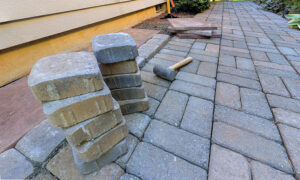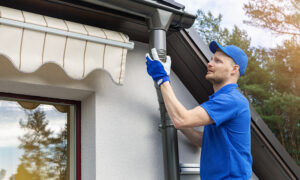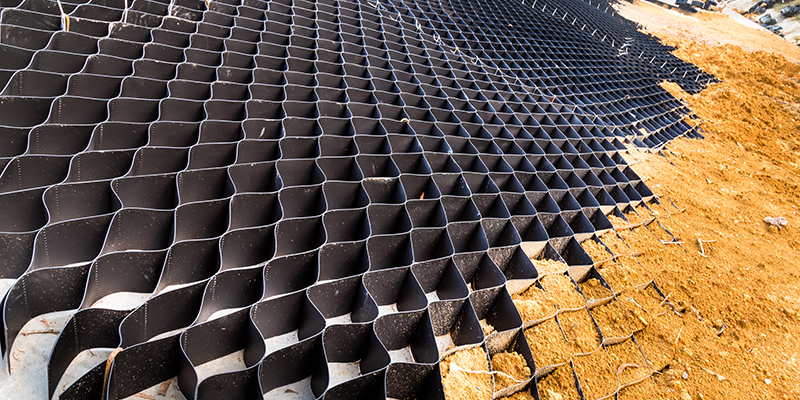Commercial property owners must stay on top of erosion control to protect their investments. Without it, the property’s very foundations could be damaged. This could lead to accidents and necessitate major repairs. It may cost a lot of money and even lead to liability in some cases.
What Is Erosion Control?
Erosion control in commercial properties is controlling or preventing water or wind from eroding the soil around the property’s foundation. Property owners can manage surface runoff and prevent soil loss through effective erosion control solutions.
Why Is Erosion Control Important?
Many property owners assume that erosion won’t be a problem if the land is flat and dry. However, despite very little rainfall and flat ground, erosion can still happen around the building’s foundation.
This is because commercial buildings often need extensive land grading and earthwork. This can disrupt the ground’s natural topography. As a result, the construction will expose the bare soil and make it more vulnerable to rain and water. Moreover, construction activities can generate sediment-laden runoff.
Runoff may pollute nearby bodies of water like lakes, rivers, and streams, impacting the water quality and aquatic ecosystems. It can lead to losing fertile land, clogged waterways, and even more flooding. But apart from its environmental impact, erosion control has several other benefits.
Firstly, the topsoil is crucial to any construction project. Erosion control will protect the topsoil and the building’s structural integrity. It can also prevent damage caused by erosion, which can cost a lot of money and resources to repair. If properly applied, erosion control can protect the building’s foundation and stabilize it. This will protect the structure’s property value and allow the owner to rent or sell it for a higher price.
Finally, there may be several environmental regulations property owners need to follow to remain compliant. Proper erosion control measures will prevent the company from facing fines or legal issues.
How to Identify Erosion
What are some warning signs that the soil around your property has begun to erode? Here are some ways property owners can spot problems with erosion:
- Suddenly exposed tree roots
- Building walls and windows splashed with soil
- Gullies around the property’s sloped areas
- Bald spots and lack of vegetation where there were once plants
- Gushing rainwater toward the property’s paved areas and into nearby storm drainages
- Bare patches of soil along the walkways, driveways, and nearby landscaping
Erosion Control Measures
The first signs of erosion should raise alarms in property owners’ heads. This is because if property owners do not address the erosion, it can lead to significant foundational issues. As a result, the property owner may need to pay a hefty bill to control the surrounding soil and repair the building. It’s best to address erosion when signs of it first appear. Here’s how to prevent erosion on commercial buildings.
1. Stabilize Slopes
Does your commercial building have any slopes around it? These are highly vulnerable to erosion because the water rushes through them a lot. Hence, it’s best to install and plant a terraced system of groundcovers and native plants. This should break up the slope and slow down the soil and water.
Property owners can also excavate and regrade the slope’s geometry or add support structures to create reinforcements. For good measure, they can also use drainage to manage the groundwater. They can add riprap areas, wood retaining or rock retaining walls, and interlocking concrete blocks.
2. Hardscapes
 Commercial construction sites will always have large, paved areas known as hardscapes. While these areas are low-maintenance because they don’t require landscaping or mowing, they’re ripe for erosion. This is because water runs off of them instead of running through them.
Commercial construction sites will always have large, paved areas known as hardscapes. While these areas are low-maintenance because they don’t require landscaping or mowing, they’re ripe for erosion. This is because water runs off of them instead of running through them.
Property owners should control erosion by using permeable materials during installation or replacement. Use flagstones, bricks, or stones set in sand for walkways and patios instead of concrete. Meanwhile, crushed stone, gravel, and permeable pavers are great for driveways.
If high-traffic areas cannot grow plants or turf, property owners can also use permeable materials like mulch, flagstones, river rock, or pea gravel.
3. Slow Down the Heavy Runoff
No commercial property is immune to rain or water exposure from cleaning, changing weather conditions, or even plumbing leaks. However, this doesn’t mean property owners cannot control water. They can employ methods to move the water slowly over the land so it can sink into the soil.
Property owners can add stones at the base of the structure’s downspouts so water splashes don’t wash away any soil. They can also add grass swales to move the water between areas. Moreover, property owners can plant a rain garden instead of deep-rooted grasses and plants. This encourages storm water to soak into the ground slowly instead of rushing to the nearest drain.
4. Cover Any Bare Soil
Bare soil is always prone to erosion. Hence, it’s best to cover it by planting grass. In the meantime, property owners can use mulch or straw to prevent erosion. They can also add mulch in planting beds for better erosion control.
 5. Install Gutters, Downspouts, and Drains
5. Install Gutters, Downspouts, and Drains
Rain will always fall, so it’s best to install downspouts and gutters to redirect the rainwater away from the foundation. Install these on the eaves of the building’s roof.
Property owners can also install proper drainage to prevent erosion. However, checking first the building’s legal and code requirements is essential.
6. Grade the Soil
Grading involves leveling out the soil. For commercial properties, the soil should slope around 3-5% within 10 feet of the building’s foundation. This can reduce how much water will reach the foundation and potentially cause water damage.
7. Regular Landscaping Maintenance
Property owners must maintain the landscaping around the property regularly to prevent erosion. This includes regular inspections and cleaning. Remove debris and leaves so they don’t accumulate around the pipes, gutters, and drains. This can help you prevent water from building up.
Stay On Top of Erosion Control
Erosion control may not always seem necessary to commercial property owners. However, they can make or break the foundation of a commercial building. Make sure to stay on top of erosion control and inspect your property regularly.
Outsourcing erosion control to professionals like Maintenance Specialists, Inc is always a good idea. Call us now at 704.405.6000 or contact us online for more details!
RELATED ARTICLES:
- What Is Commercial Roof Flashing And How Important Is It?
- How Valuable Is A Means Of Egress Maintenance Service?
- Why Is Sealing Air Barriers Penetrations In A Commercial Building Crucial?

